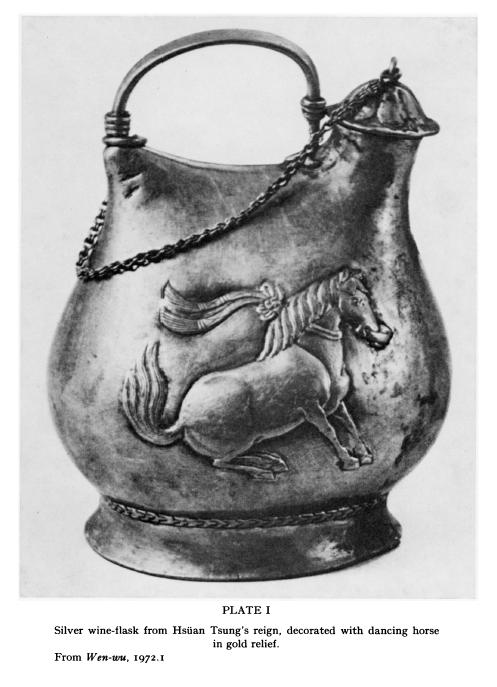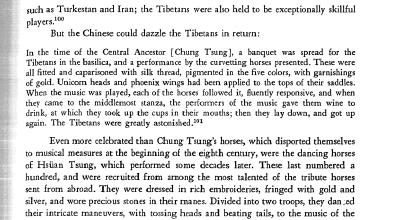Immortal Meals #35: Bewitched Chinese Dancing Horses October 28, 2017
Author: Beach Combing | in : Medieval , trackbackIt is a WIBT (wish I’d been there) moment from Chinese history. One night in the mid-late eighth century the warriors of the Chinese warlord Ch’Eng-szu (704-778) were preparing a sacrificial feast. Some struck up music to add to the festive atmosphere when suddenly a very strange thing. Dozens of the war horses in the field behind them got into line and began to prance in a synchronized fashion to the tune, banging their hooves in unison. The onlookers were horrified at these bizarre dancing horses and news quickly spread that Ch’Eng-szu’s horse were bewitched.
As it happens the explanation was not supernatural. The horses in question had been taken as booty from the Emperor Hsuan Tsung (r. 712-756). They were, in fact, his famous dancing horses, though a vulgar Chinese warlord was using them, well, vulgarly, for war. We have relatively good records of this dancing troupe because they so impressed Imperial contemporaries that the horses galloped into poems and works of art (see the bronze dancing horse at the head of this post). There were four hundred in the full troupe divided into four sections. They were dressed up to look dandy, of course: ‘it was decreed that the horses be caparisoned [had to look this word up] with patterned embroidery, haltered with gold and silver, and their manes and forelocks dressed out with assorted pearls and jades’. They had one song that they danced to, perhaps the one that Ch’Eng-Szu’s warriors accidentally struck up. They would shake their heads and tails to this song, then run up a stage platform and down again, going to left and right – sometimes, oh marvel, the stage platforms were lifted into the air while the horses continued to dance in midair. We know that at the climax of the piece the horses stepped forward, took a glass of wine in their teeth and downed the drink before the Emperor: the song was called ‘the Upturned Cup’. This was presumably the signal for universal merry-making. These were the magnificent steeds who found their way into the clutches of Ch’Eng-szu. Beach pays tribute to those now forgotten horses by quoting the finest verse to survive about them.
Clinking trinkets of purple jade dangle over their jeweled stirrups;
Striated halters of bice-blue silk gird their golden bridles
Following drum and song, they bolt away fulgorously; [brilliant invented adverb, well done translator]
Mete with grelot and sword, they gallop tempestuously:
Demeanor collected, their light step remains nimble;
Mettle concentrated, their rapid gait does not waver.
Their brilliance rivals the white sun descending,
Their breath envelops the verdant haze lowering.
Of course, things ended badly as they almost always do with Chinese warlords. Ch’Eng-Szu was so disturbed to hear about his ‘bewitched’ horses that he ordered them whipped, to which the horses responded by still more vigorous dancing, thinking that they were being corrected and that their performance did not satisfy. The warlord, thus, had his witchy horses killed and so ended the glorious dancing horses of Hsuan Tsung, one of the great but useless glories of the world, like Bavarian castles and artificial ski slopes
Other remarkable horses: drbeachcombing AT yahoo DOT com
This essays owes all to Paul Kroll, ‘The Dancing Horses of T’ang’, T’oung Pao 67 (1981), 240-268
31 Oct 2017 Southern Man sent me this passage from Schafer, Golden Peaches, a wonderful book




